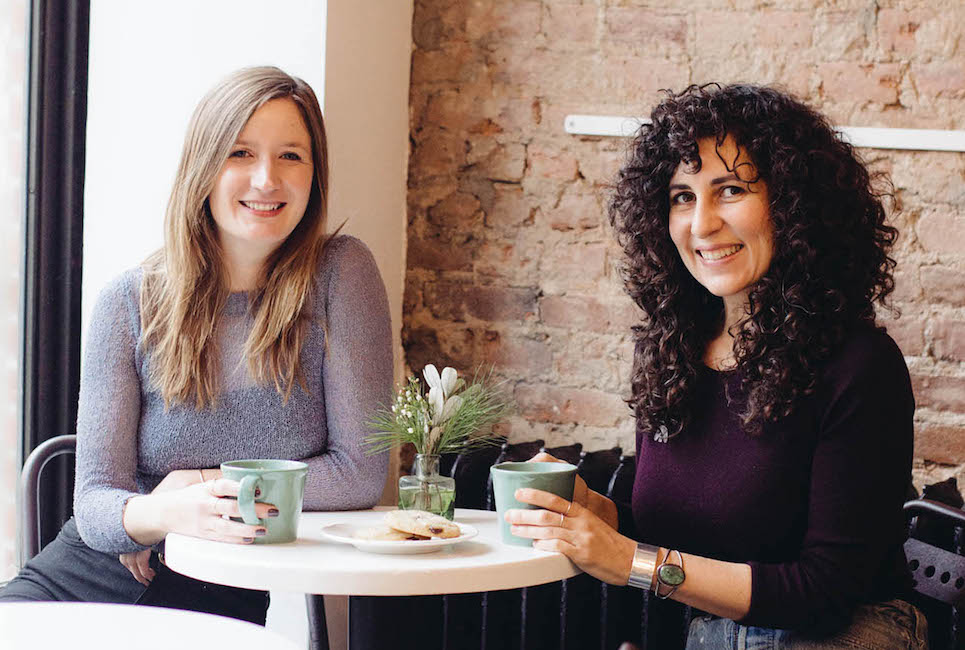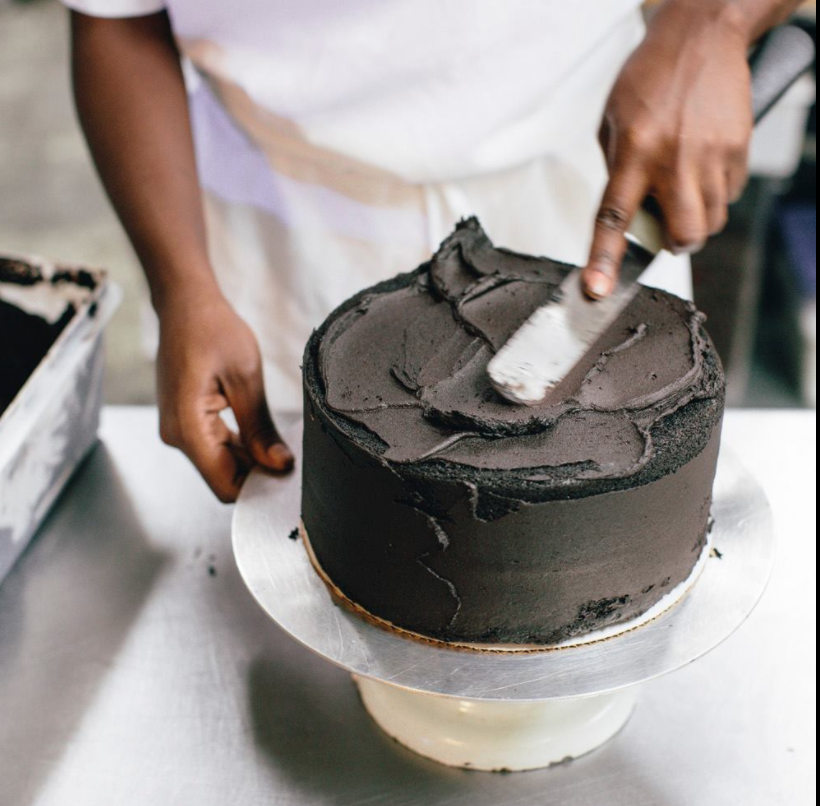
This article originally appeared on B The Change.
Ovenly, a New York City retail and wholesale bakery business was founded in 2010 by two female entrepreneurs.
The company “scales profit and business to create progressive social change,” putting a high premium on social responsibility, such as through its open-hiring policy.
Customers come to Ovenly for the salted chocolate chip cookie and a Brooklyn blackout cake.
They may not be aware that they are also supporting a revolutionary way to employ people who might not otherwise have a chance at a job. Employees at Ovenly’s locations are brought on through an open-hiring process, meaning there are no interviews to get a job at the company.
As described here, Ovenly has had an open hiring policy since 2012, working with organizations such as Getting Out Staying Out, Drive Change, The Center for Economic Opportunity, and the Ansob Center for Refugees, to hire political refugees and citizens returning from the criminal justice system.
Instead of a traditional interview process, candidates come in for a “trial” during which they shadow different positions for four to six hours to assess their skills and where they might fit.
These partnerships have not only given the team “some of the best staff members Ovenly has ever had,” but have created a curated talent pool based on the partners’ knowledge of their needs and ongoing support for their employees. Through these partnerships, they have been able to create higher levels of employee retention in a high-turnover industry.
The company now had 56 employees and have been expanding to additional locations quickly. An active participant in the Best for NYC Campaign, Ovenly has used the Best for NYC Challenge to think through new benefits for their team. The Best for NYC Challenge is a free, online tool to help business owners compare their impact on NYC workers, communities and the environment against 8,000-plus businesses, and the platform provides free resources to improve.
Below is an interview with Katherine Dumais, formerly with Best for NYC, and Agatha Kulaga, a co-founder of Ovenly.

What inspired you to start Ovenly?
Both my business partner and I definitely had previous careers in non-food related areas, and we both were working very hard to build our careers, and at some point we got burnt out on the jobs we were at. I felt I needed a change. I think there is the idea of wanting to start your own business to be able to make the change in your life and other peoples lives’ as you see fit. I had also been baking on the side, more as a reprieve from the stress of the work I was doing. It was a way for me to find a little bit of comfort in my own personal life.
I was also in a food-focused book club where I met my business partner. We started chatting, and we realized that we had a lot of similar characteristics in terms of our work ethic and determination and wanting to really take a leap and start new careers, and we met a week later and decided to start a business together. It was a huge leap for us, and it was something that we discussed for about a year before we landed on the idea of Ovenly.
So the way Ovenly got started is that we were really both passionate about food and baking. We knew we wanted to start a bakery and make a lot of delicious desserts, but we wanted to make some sort of bigger impact with our business and that’s how we started to work with Getting Out & Staying Out (GOSO). The rest is history.
The people who have continually surprised us are the people who have come from the most challenging backgrounds, and that to me is so meaningful.
Are there specific socially responsible practices you are particularly proud of?
We instituted open-hiring practices in our businesses. We don’t require that someone has a resumé to apply for a job with us. We don’t care about someone’s education or personal background. We only care about someone coming in and showing that they are eager and excited to work and are passionate about what we are doing.
We want people to work hard and have fun in doing the work we are doing. And I think that what I am continuously impressed by is the people who come into our business who have no food background what so ever — no experience working in the kitchen — and go from working as a porter and continually move up into different positions and gain more experience. It really just showed us that you don’t need the experience, you need the work ethic and the attitude to succeed and build a career in the business we have here. That’s what’s most important to us.

How did you all begin your open-hiring policy?
In 2012, we opened our bake shop in Greenpoint. One of our regular customers was Geoffrey Galia from GOSO, and he came into the shop one day and said, “Hey, I work with young men who have been previously incarcerated or have gone through the criminal justice system, and we do really incredible job training and education with them at our program. Then we try to place them in internships in various businesses based on their interests and skills. Would you ever consider taking any of our guys as interns?”
Given that my business partner worked in nonprofits in arts management and I worked in social work and psychology/psychiatry, both of us didn’t hesitate to say, “Yes.”
It was obvious that was something that we would want to do. And so we opened up a few intern positions for some of the GOSO guys, and it was an opportunity for us to rethink how we were approaching our hiring practices and the interview process.
At that time when we had the GOSO interns come in, we had a few people that were referrals from other employees, and so it was a cousin of someone or a brother of someone. Those people who came in and didn’t have resumés — if they had come in and had to interview for the position, I don’t know if they would have answered the questions in the right way or would have presented in a way that would have compelled me to hire them. But when they came into the kitchen everything about them was right. They became some of our best employees.
I think in terms of work motivation, work ethic, and, really, the desire to want to change your own life, that is enough to be able to succeed and really build a career. We’ve been doing open hiring since 2012, and we now have partnerships with GOSO, the Center for Employment Opportunities and Drive Change — all programs that place people who have gone through the criminal-justice system. And we also work with the Ansob Center for Refugees to place political refugees in jobs at Ovenly.

What’s your step-by-step process to do open hiring?
If anyone contacts us by email or by phone, or if they just come into the kitchen and express interest for a position, we ask them what their experience is. If they do have a resumé, obviously they can provide it. If they don’t have a resumé, we just ask them to provide a few references, personal or professional, who can just give us a sense of who they are. And then, for back-of-house positions, we will schedule them for a trial. We don’t do an interview, we actually have them come in to do a four to six hour trial for a position, or for a few positions.
Generally, we decide on the spot if we want to hire that person or not. And, generally, if they come in and we think they might be a good fit, but we are a little unsure, we ask them to come back because there can be a lot of pressure and nervousness when coming in for the first time, so we often times will give someone a second opportunity to come in.
In terms of the onboarding, we generally go through the training piece. Once someone is actually hired, they go through a three-month training period. We ask people to invest the time and energy to master the positions they are in, and if they do, we are always willing to move people up and around to different positions based on what they are actually interested in. We don’t expect people to want to do the same job for five years. We want people to grow and we strive to provide people with greater earning potential, whether at Ovenly or somewhere else.
If we can continue to make a difference in that way, and really reduce the stigma for people who have faced employment challenges and overall life challenges for so long, then that is where I really think we can really make a difference.
In the food industry, there is so much turnover, and that is such a huge challenge for so many of our colleagues, anyone who owns a food business, turnover is such a huge challenge. On the flip side of that, being in the food industry right now, there is such potential for making a great impact because it is the fastest growing sector of our economy. So just in terms of our hiring practices right now and the partnerships that we have with these job training programs, what is great for us, is these partnerships provide us with an opportunity that is both financial and social.
Our turnover rate at this point for back of house is 8 months to a year, and for us, we actually think that is great. And obviously we want that to be higher. We have worked really hard to provide great benefits to our employees. We offer a wonderful paternity and maternity leave policy that other large corporate businesses don’t even offer. That is something that is very important to us and especially being a woman-owned business, is something that we wanted to do from the start. We offer paid sick leave, free yoga, and a family meal at every shift, and we provide training on financial literacy, entrepreneurship, and environmentally sustainable kitchen practices, such as composting.
Do you have any larger goals that you are striving for in your business as you are moving forward? Where do you see Ovenly in five years?
Our real focus right now is continuing to scale our business in a responsible way. We are continuing to grow our retail network and we are opening more stores, so we are continuing to create more jobs both on the retail side and the back-of-house side. I would really love to get to a place where where we are filling other positions in addition to the back-of-house openings in the company with the referrals we are getting. I think it is just a different type of training people need.
We are working with our job partners to figure out, “What are the training needs for the variety of different positions we have?” For example, if someone doesn’t have any customer-service experience, it takes a lot more training to get there on that end, so what are the skills that we can provide and what is the training required? There are so many food businesses that need the same type of trainings, so how do we share our resources better to retain employees and have employees build the strength and skills to succeed in the position they are in. I think there is a way to create training programs where people can share these resources and we can have larger trainings that employees can actually go to and build the skills that they need.
Our aim is really to build healthful communities as we grow our business. By healthful communities, we mean being able to create jobs for our employees that are meaningful to them, help them grow their careers, and create a better life satisfaction for them.
I think a huge part of it is getting other business on board to really work on being open to creating jobs for everyone. And I think a big part of it is eliminating stigma, specifically for returning citizens — especially for returning citizens. A lot of times the question is: “Do you ever feel unsafe? If you don’t know someone’s criminal history, if you don’t know their job history, how do you know what a person’s character is?” My answer to that is always, “If you accept someone off the street who is applying from Craigslist, how do you know where that person is coming from?”
The people who have continually surprised us are the people who have come from the most challenging backgrounds, and that to me is so meaningful. And if we can continue to make a difference in that way, and really reduce the stigma for people who have faced employment challenges and overall life challenges for so long, then that is where I really think we can really make a difference.
What changes have you implemented as a result of the Best for NYC program and Best for NYC Challenge?
We created an employee-wellness position, and added more employee benefits since we have done the Challenge. We ended up meeting with our management team and then with the rest of the team to redefine our mission, vision and values as a company. After we did the Challenge, we created a few different surveys for our team members to gather metrics about our employees and ask questions about their demographics — where they are coming from, the job experience they have had, what they feel like Ovenly is providing, the compensation they have had at other jobs, what they are getting here, whether they’re interested in any other types of benefits.
All of that information we gather from people who come on board, and we also instituted employee surveys throughout the year to get a sense of what our employees want from Ovenly and what their job satisfaction, personal life satisfaction and goals are as well.






